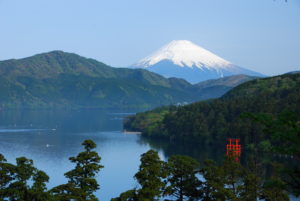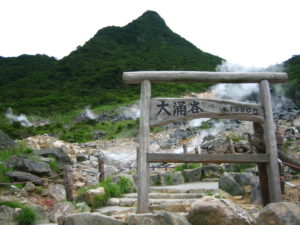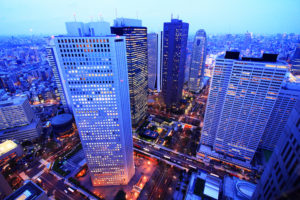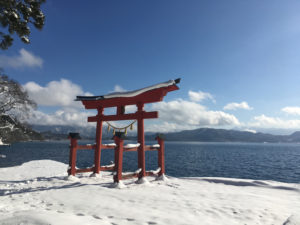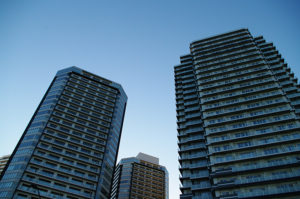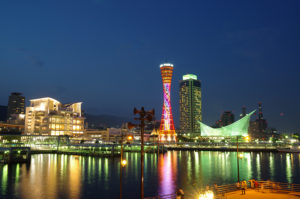
In light of the surging inbound tourists, Japanese and foreign developers and hotel companies have stepped up construction, with names like Hyatt, Marriott, Nomura Real Estate Development and Mitsui Fodosan building new accommodations.
We have been increasingly receiving the inquiries from overseas investors about the properties in Kyoto for vacation rentals.
Generally speaking, lots of investments money to build the hotel and private lodging are flooding in Kyoto now from both inside and outside Japan and therefore the good properties with hotel license tend change hands very quickly.
There are very attractive investment opportunities for foreign investors in Kyoto properties.
I am going to discuss the opportunities of vacation rental in Kyoto today.
Let me start with the recap on the inbound tourism market in Japan, in particular, Kyoto.
The number of foreign visitors to Japan rose 19% to a record of nearly 29 million in 2017.
The government set the road to the target of 40 million by 2020 when Tokyo will host the Olympics.
Spending by foreign visitors rose 18% to ¥4.4 trillion ($40 billion).
Tourists have transformed the face of the nation’s cities, crowding into popular destinations such as the Ginza shopping area in Tokyo, temples in the ancient capital of Kyoto and ski
areas during the winter.
For example, the number of American visitors rose 11% in 2017 to 1.24 million which accounts for about 4% of the total.
Read more
Tag Archive for Real estate investment
Where are the top destinations for people seeking real estate in greater Tokyo? : Two locations in Saitama stand out
(Picture: Yokohama)
Recruit Sumai Co., operator of the Suumo residential information website, recently released the ranking of locations
(and train stations) where people in the Kanto region want to reside in 2018.
(Kanto region in this report covers Tokyo, Kanagawa, Chiba, Saitama and Ibaraki)
They released the same report for Kansai region (including Osaka, Kyoto and Kobe as well.
The survey began in 2010 and has been conducted every year.
7000 people in the Kanto area responded and they are in the
age between 20 and 49. People over 50 years old are not surveyed, which naturally distorts the statistics.
Here is the ranking for 2018 and data in 2017 and 2013 are also illustrated for a comparison purpose.
(Breaking news) New mortgage loan for the rental investment by a Japanese bank for foreign nationals
Just a quick breakthrough note :
Last week, we have managed to establish the strategic alliance with one of the prominent Japanese banks who can offer foreign nationals loan for the investment property in Japan.
There are three categories.
1. Foreign nationals who reside in Japan with the permanent residence
(Individuals who live in Japan without PR could be also eligible)
2. Foreign individuals who reside in Hong Hong (Hong Konger)
3. Foreign nationals who do not live in Japan
Category 2 and 3 are the breakthrough products.
No Japanese banks have been willing to offer the loan for foreign nationals who do not live in Japan but the window has just opened.
Obviously there are certain conditions such as down payment and taking out the mortgage.
And the approval is subject to the valuation of the property by the bank and financial status of each investor.
In addition, you need to carefully select a property which the bank is likely to offer the loan by meeting their criteria.
My bank is very picky about the location.
The property must be in the metropolitan cities where reasonable rental demand can be expected.
These cities are specifically Tokyo 23 wards, Yokohama, Kawasaki, Chiba, Nagoya, Osaka, Kyoto, Kobe and Fukuoka.
The property must be within 10 min walk distance from the nearest train station.
Airbnbs and hotels are excluded (meaning it must be a property to rent or your own house)
Interest rate is attractive enough to create the good cap rate.
Japan’s interest rate is historically low due to the quantitive easing by the central bank.
Anyone who is in interested in such loan, please send us a direct message via
contact us.
Toshihiko Yamamoto
Real estate investing consultant and author.
Founder of Yamamoto Property Advisory in Tokyo.
International property Investment consultant and licensed
real estate broker (Japan).
He serves the foreign companies and individuals to buy and sell
the real estates in Japan as well as own homes.
He holds a Bachelor’s degree in Economics from
Osaka Prefecture University in Japan
and an MBA from Bond University in Australia
Toshihiko’s book, “The Savvy Foreign Investor’s Guide to Japanese Properties: How to Expertly Buy, Manage and Sell Real Estate in Japan”is now out on Amazon, iBooks (iTunes, Apple) and Google Play.
About the book
Amazon.com Link
2020 Tokyo Olympics revamping central Tokyo
(Current JR East ‘Harajuku’ station)
Tokyo will host the Rugby World Cup in 2019 and Olympics and Paralympics in 2020.
In view of the two big events and rapid growth of the inbound tourism, In Tokyo, there are a number of revamp projects in the pipe line now.
Today I pick up one of the projects by EAST Japan Railway Company (JR East)
involving Sendagaya station which is the closest station to the new National Stadium and Harajuku Ekimae project by NTT group.
Tokyo and neighbouring cities have been developed sufficiently and in a sense have been seeing the matured status
over the years,however, when the new development plans are revealed by the developers and the railway companies,
the real estate price in the redevelopment area picks up and price hike is likely to continue for over several years.
Risks in real estate investment in Japan-natural disaster- : How to avoid the earthquake risk
Japan has the risk of earthquake.
You remember the earthquake in Kobe in 1995 and Tsunami disaster in Fukushima in 2011.
Although Japan’s earthquake-resistant technology of buildings is considerably advanced than that of other countries,
we have to be realistic.
In the interest of personal safety and protecting the value of what is likely your biggest financial asset,
prospective buyers and investors should be aware of any natural disaster risk impacting a potential property purchase.
If the building is broken or collapsed due to an earthquake, you cannot get rent.
In most cases, learning about natural disaster risk will not stop investment, but it will help investors make a better-informed decision about where to buy and preparing in terms of appropriate insurance coverage depending on the type of natural disaster risks most affecting the property.
Unfortunately we don’t have a comprehensive ‘natural disaster risk score’ covering whole Japan announced by the government or a certain institute but on the prefecture and city level, many prefectures and cities
release ‘hazard maps’ to show the risks of natural disasters
in the area.
Read more
Unpaid rent risk : Risks in private real estate investment in Japan (Part3)
Obviously, getting tenants is a prerequisite for making money from your rental property. However, getting just any tenant does not guarantee your investment.
If you get bad tenants, you run the risk of your rent not being paid on time while repayment for loan and maintenance costs being accumulated.
Additionally, depending on how bad your tenants are, your rental property might get more damaged that normal use.
If you have a really bad tenant, you might even have to deal with an eviction.
Today I will discuss the risk of rent being unpaid and how to eschew the risk.
If you own investment real estate, there are expenses you have to pay monthly.
・Payment of administrative expenses · repair and maintenance.
・Monthly repayment for loan
If there is rent income properly every month
you can pay the above cost from the rent, but once the rent is unpaid your income statement will become negative.
How to deal with unpaid rent ?
Is it the good time to buy a property in Tokyo ? – Quick recapitulation on condominium market in Tokyo in 2017-
Tokyo kankei (Japan’s institute for real estate study) recently announced
the market report on the condominiums in greater Tokyo area.
We have made the recapitulation of the report for the clients.
I will share a part of our report today.
Both prices of newly built second-hand condominiums and
unit price per square meter has gone up.
New construction projects were supplied mainly in central area of Tokyo
which sharply makes price rise.
The average price in the Tokyo metropolitan area (Tokyo and neighbouring cities) of newly built condominiums was 55.44 million yen, up + 9.0% from the previous year’s 50.87 million yen.
Because it was falling the previous year, it rose for the first time in two years, and the
whole metropolitan area shows a trend of rising again from a high stop.
The reason for price rise was due to the strong tendency of supply to concentrate in central Tokyo.
The average area for each condominium was 63.24 square meters, which was up 3.1% from 61.33 square meters in the previous year.
How safe is Japan to invest ? and which part of Tokyo you should consider ? -crime rate-
Do you want to buy a house or invest in Japan ?
If you’re considering an international investment property, step one is to find a good real estate agent who understands the country’s regulations,
especially if you’re not fluent in the local language.
Next question is what sort of criteria for judgement do you have in your mind for finding a property ?
If you don’t know what you’re looking for, you’ll never find it.
How about crime rate ?
Good.
Japan is safe.
Having lived in Kobe, Kawasaki, Tokyo, Sydney, Gold Coast, London
and travelled over 25 countries, I can assure it. And crime rates are an important indicator to analyze when looking for an investment property.
Buying the property in a high crime country or area can be risky not only to you, but also to your investment or even to your tenants.
High crime generally reduces the values of properties in a given area.
A study in USA for example, found that a 10 percent reduction in homicides resulted in an 0.83 percent increase in housing values the following year.
Needless to say, people in Japan do care about the safety in the neighborhood.
I am not saying that you can’t make money in areas with higher crime.
There could be a good number of investments in areas with a relatively high crime rate. There are still?plenty of good people in those areas that you can make money renting or selling to.
But the important thing is to know what you are getting into.
It is important up front to decide what kind of risk tolerance you have and what types of areas you are willing to invest in.
But how safe is Japan ?
Once you’ve decided on what kind of areas(countries) you are looking to invest in,
you can start to research them. Always ask Google first.
Here is the some statical data on some developed countries by UN, GLOBAL STUDY on HOMICIDE 2013.
How can you know if your property in Japan is a good investment ?
There are a number of options and variations in the real estate investment opportunities in Japan.
You can invest in the condominiums, residential buildings, flipping the existing houses, flipping the abandoned houses, office buildings
boutique hotels and small hostels so on.
You also have to decide the area you want to invest.
Is it in Tokyo, neighboring areas of Tokyo or local cities which usually offer more attractive yields ?
Each option has both pluses and minuses.
In this article today, however, I will discuss in general what I think a good rental property is and what things to look at when you are considering buying a property for the investment in Japan.
In my opinion, you need to consider the following factors.
Monthly cash flow, the location, the value (appreciation), the condition of the property, the market and your age.
Taxes and other factors need to be considered as well.
Understanding the tax angles when you buy the property in Japan Part-1
Understanding the tax angles when you buy the property in Japan Part-2
Brief on Inheritance tax in Japan as of 2017
Among the above factors, the first thing I look is the monthly cash flow.
High yielding, guaranteed rent should be too good to be true ?: ‘Kabocha no basha’ subletting problem in Japan

Pitfall of sub-leasing(sub-letting) real estate investment
High yielding, guaranteed rent(sub-leasing) should be too good to be true ?
Recently one of the scandals which rattled the industry is KABOCHA-NO-BASHA
(Pumpkin Carriage) problem.
The background of the scandal is as follows.
Investors were guaranteed a fixed monthly amount over an extended period if they invested money by contracting with a real estate company called Smart Days(Tokyo)
that used the funds to set up and manage share house facilities under sub-leasing agreement.
Since 2015, Smart Days, operator of women-only share houses called Kabocha no Basha (Pumpkin Carriage), has promoted high yield investments through the media and has mainly acquired customers of office workers. In the sub-leasing contract, rent payment collected through the sub-leasing is sought to pay back the debt for a long period plus small profit.
For example, suppose you borrow 100 million yen from a bank and the monthly repayment amount is 500,000 yen, if you earn rental income of 550,000 yen a month, it will generate 50,000 yen a month profit. This system is typical leveraging in the real estate investing and there is no red flag about it.
In an ideal setting, Smart days as the sub-leasing company would rent out rooms to tenants and bring in a steady and continuous supply of rent, a portion of which would go to the investors.The shared house with shared toilets and bathrooms is not as wide as 7 m² in living space, but the initial cost of moving in is kept low (so they say), and it was expected that more women moving into Tokyo from rural cities will choose to stay in these share houses.Smart days also promoted the business to support tenants finding a job (This is an alarming part)


